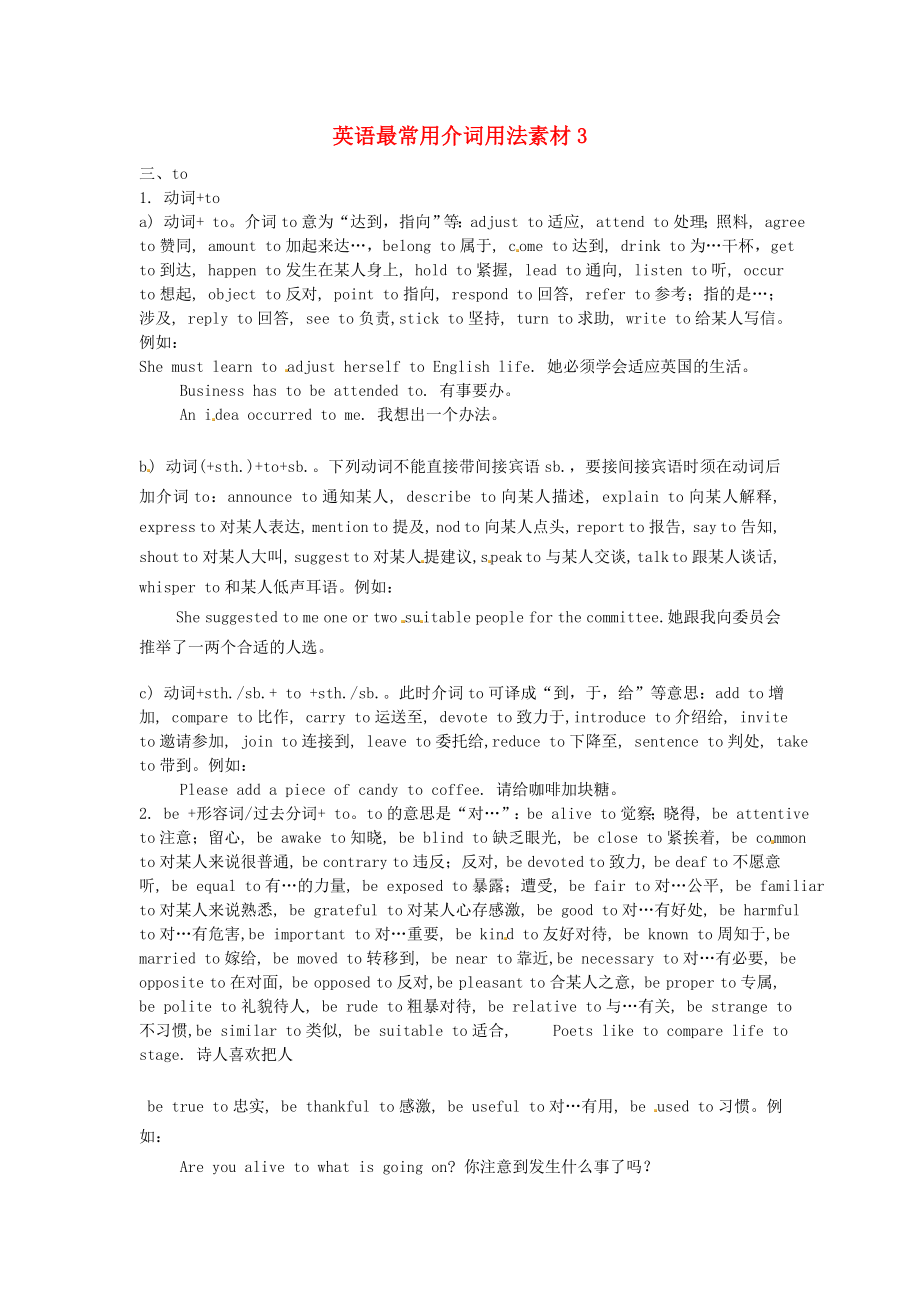《天津市太平村中學(xué)高中英語(yǔ) 英語(yǔ)最常用介詞用法素材3 外研版必修2》由會(huì)員分享���,可在線(xiàn)閱讀�,更多相關(guān)《天津市太平村中學(xué)高中英語(yǔ) 英語(yǔ)最常用介詞用法素材3 外研版必修2(2頁(yè)珍藏版)》請(qǐng)?jiān)谘b配圖網(wǎng)上搜索�。
1、英語(yǔ)最常用介詞用法素材3
三�����、to
1. 動(dòng)詞+to
a) 動(dòng)詞+ to���。介詞to意為“達(dá)到���,指向”等:adjust to適應(yīng), attend to處理;照料, agree to贊同, amount to加起來(lái)達(dá)…���,belong to屬于, come to達(dá)到, drink to為…干杯,get to到達(dá), happen to發(fā)生在某人身上, hold to緊握, lead to通向, listen to聽(tīng), occur to想起, object to反對(duì), point to指向, respond to回答, refer to參考����;指的是…;涉及, reply to回答, see t
2�����、o負(fù)責(zé),stick to堅(jiān)持, turn to求助, write to給某人寫(xiě)信。例如:
She must learn to adjust herself to English life. 她必須學(xué)會(huì)適應(yīng)英國(guó)的生活��。
?? Business has to be attended to. 有事要辦��。
?? An idea occurred to me. 我想出一個(gè)辦法�����。
b) 動(dòng)詞(+sth.)+to+sb.��。下列動(dòng)詞不能直接帶間接賓語(yǔ)sb.��,要接間接賓語(yǔ)時(shí)須在動(dòng)詞后加介詞to:announce to通知某人, describe to向某人描述, explain to向某人解釋,
3�����、 express to對(duì)某人表達(dá), mention to提及, nod to向某人點(diǎn)頭, report to報(bào)告, say to告知, shout to對(duì)某人大叫, suggest to對(duì)某人提建議,speak to與某人交談, talk to跟某人談話(huà), whisper to和某人低聲耳語(yǔ)���。例如:
?? She suggested to me one or two suitable people for the committee.她跟我向委員會(huì)推舉了一兩個(gè)合適的人選���。
c) 動(dòng)詞+sth./sb.+ to +sth./sb.。此時(shí)介詞to可譯成“到����,于�,給”等意思:add to增加
4�����、, compare to比作, carry to運(yùn)送至, devote to致力于,introduce to介紹給, invite to邀請(qǐng)參加, join to連接到, leave to委托給,reduce to下降至, sentence to判處, take to帶到����。例如:
?? Please add a piece of candy to coffee. 請(qǐng)給咖啡加塊糖。
2. be +形容詞/過(guò)去分詞+ to����。to的意思是“對(duì)…”:be alive to覺(jué)察;曉得, be attentive to注意��;留心, be awake to知曉, be blind to缺乏眼光, b
5�、e close to緊挨著, be common to對(duì)某人來(lái)說(shuō)很普通, be contrary to違反;反對(duì), be devoted to致力, be deaf to不愿意聽(tīng), be equal to有…的力量, be exposed to暴露�;遭受, be fair to對(duì)…公平, be familiar to對(duì)某人來(lái)說(shuō)熟悉, be grateful to對(duì)某人心存感激, be good to對(duì)…有好處, be harmful to對(duì)…有危害,be important to對(duì)…重要, be kind to友好對(duì)待, be known to周知于,be married to嫁給, be m
6、oved to轉(zhuǎn)移到, be near to靠近,be necessary to對(duì)…有必要, be opposite to在對(duì)面, be opposed to反對(duì),be pleasant to合某人之意, be proper to專(zhuān)屬, be polite to禮貌待人, be rude to粗暴對(duì)待, be relative to與…有關(guān), be strange to不習(xí)慣,be similar to類(lèi)似, be suitable to適合,?? Poets like to compare life to stage. 詩(shī)人喜歡把人
be true to忠實(shí), be thankful t
7��、o感激, be useful to對(duì)…有用, be used to習(xí)慣��。例如:
?? Are you alive to what is going on? 你注意到發(fā)生什么事了嗎��?
?? The old man was not equal to the situation. 那老人不能應(yīng)付這種情況��。
?
? His house is opposite to mine. 他的房子在我的房子對(duì)面�。
3. to+名詞構(gòu)成的詞組有:to a degree在某種程度上, to date到現(xiàn)在為止,to one’s feet跳起來(lái),to one’s mind照…看來(lái), to one’s surprise使…吃驚, to one’s taste符合胃口, to oneself獨(dú)自享用, to order定做, to the letter不折不扣地, to the point中肯地
 天津市太平村中學(xué)高中英語(yǔ) 英語(yǔ)最常用介詞用法素材3 外研版必修2
天津市太平村中學(xué)高中英語(yǔ) 英語(yǔ)最常用介詞用法素材3 外研版必修2

